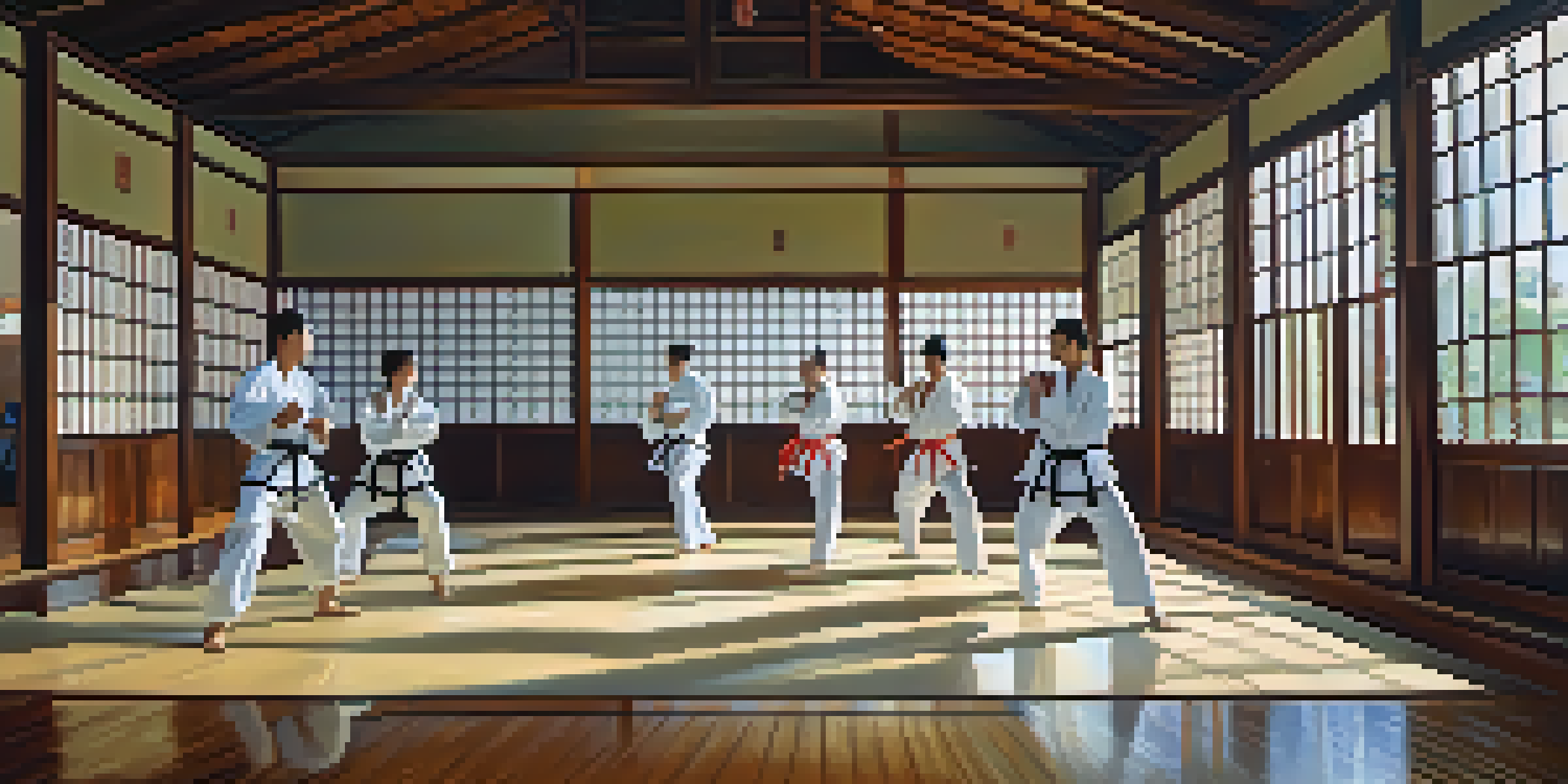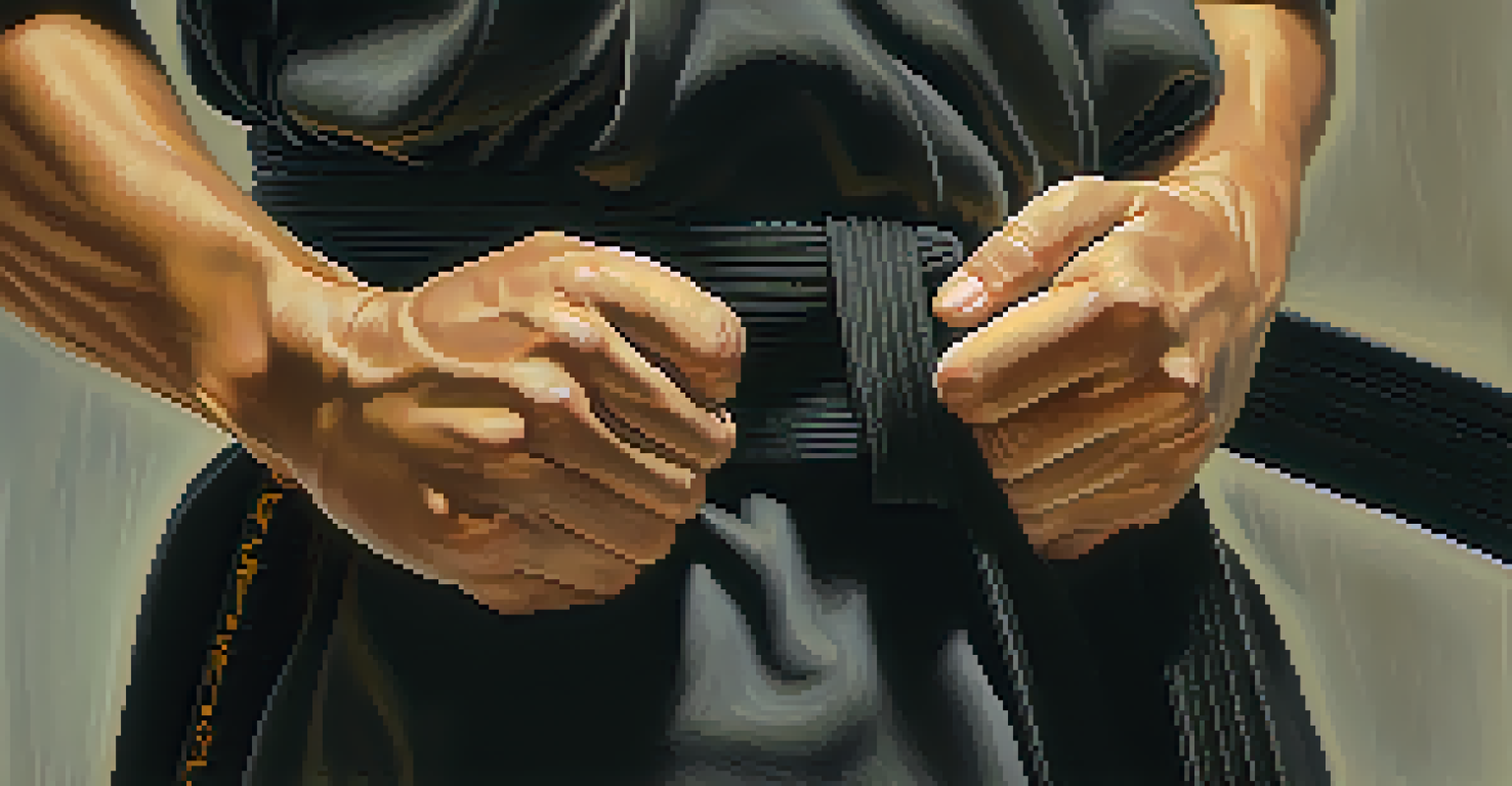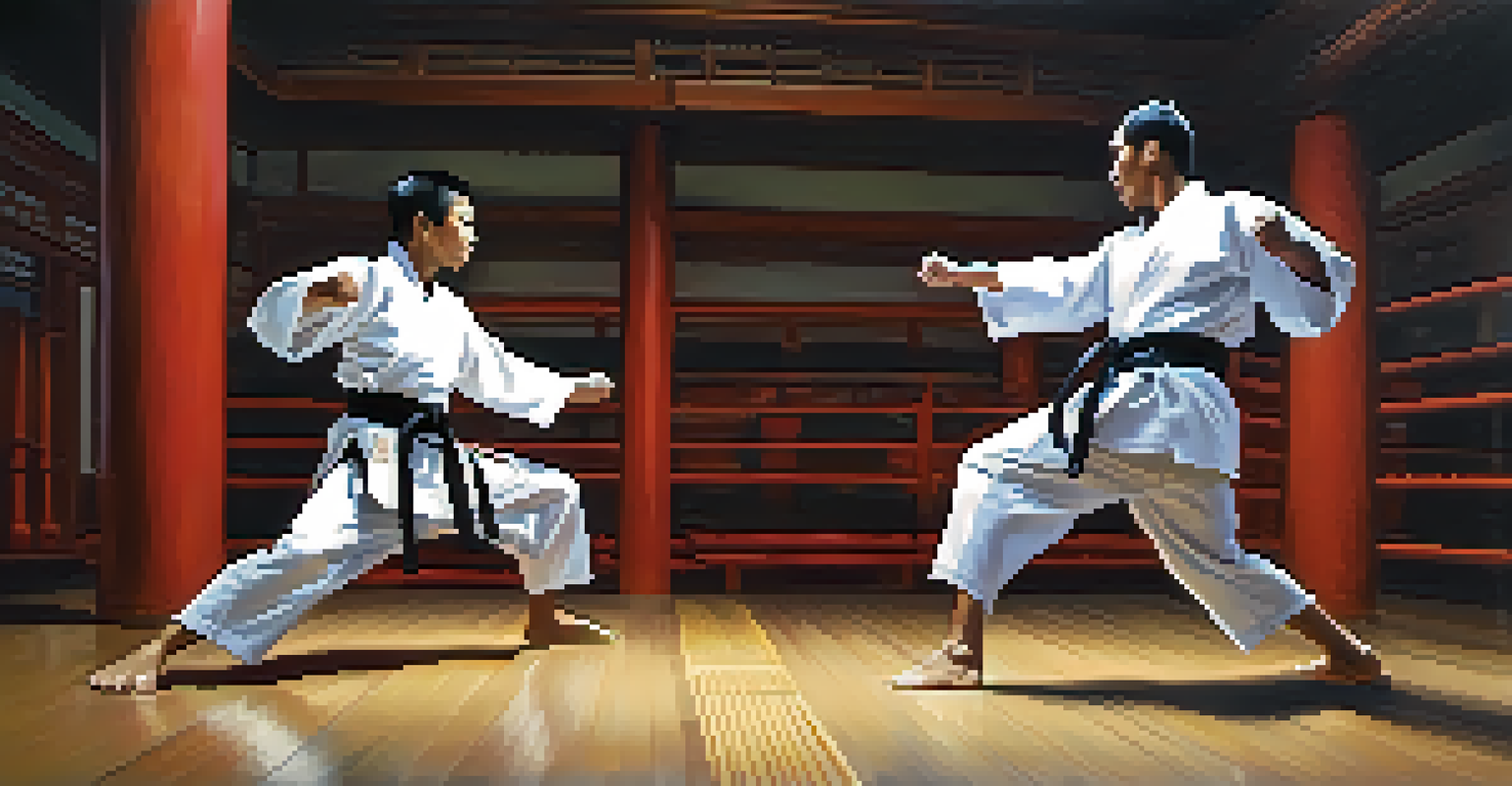Martial Arts: Building Emotional Resilience Through Training

Understanding Emotional Resilience in Martial Arts
Emotional resilience is the ability to adapt to stress and adversity, and martial arts training provides a unique environment to cultivate this quality. Through various techniques and practices, martial artists learn to manage their emotions, particularly under pressure. This adaptability is not just beneficial in the dojo; it extends to everyday life, helping individuals navigate challenges with composure.
The greatest glory in living lies not in never falling, but in rising every time we fall.
Training in martial arts involves repetitive practice, which allows individuals to face discomfort and learn from failures. Each time a student falls or is challenged, they have the opportunity to get back up and try again, reinforcing the mindset that setbacks are part of the journey. This process instills a sense of confidence and perseverance, essential traits for emotional resilience.
Moreover, martial arts encourage self-reflection and discipline, enabling practitioners to recognize their emotional triggers. By understanding how to respond rather than react impulsively, students develop a stronger emotional foundation. This foundation not only strengthens their martial arts skills but also enhances their overall well-being.
The Role of Mindfulness in Martial Arts Practice
Mindfulness is a key component of martial arts training, helping practitioners stay present and focused. Many martial arts involve techniques that require deep concentration, such as forms (katas) or sparring. This focus allows students to tune into their bodies and emotions, creating an awareness that is crucial for emotional resilience.

Practicing mindfulness helps martial artists manage anxiety and stress, particularly during competitions or high-pressure situations. By learning to breathe deeply and center themselves, they can maintain control over their emotions. This ability to stay calm under pressure translates to real-life situations, allowing individuals to approach challenges with a clearer mindset.
Emotional Resilience Through Training
Martial arts training enhances emotional resilience by teaching practitioners to adapt to stress and manage their emotions effectively.
Incorporating mindfulness into martial arts not only sharpens physical skills but also nurtures emotional stability. When students practice staying present, they learn to detach from negative thoughts and feelings. This detachment fosters a healthier emotional landscape, enabling them to respond positively to adversity.
Building Confidence Through Skill Mastery
As practitioners progress in their martial arts journey, they gain confidence through skill mastery. Each belt earned or technique perfected serves as a tangible reminder of their dedication and growth. This sense of achievement plays a crucial role in enhancing emotional resilience, as it reinforces the belief that hard work leads to success.
Success is not final, failure is not fatal: It is the courage to continue that counts.
Confidence gained from martial arts training can spill over into other areas of life, providing a strong foundation for tackling challenges. Whether facing a difficult project at work or dealing with personal issues, the self-assurance built through training can make a significant difference. Students learn to believe in their abilities and approach obstacles with a positive mindset.
Moreover, the supportive community found in martial arts schools contributes to this confidence. Practitioners cheer each other on, creating an environment where everyone feels valued. This camaraderie helps individuals feel more secure in their journey, further bolstering their emotional resilience.
Learning to Handle Failure and Setbacks
Failure is an inevitable part of any learning process, and martial arts provide a safe space to experience and learn from it. Each time a student loses a sparring match or struggles to master a technique, they face their limitations head-on. This experience teaches them that failure is not the end, but rather an opportunity for growth and improvement.
Embracing failure is essential for building emotional resilience. Martial artists learn to analyze their mistakes, identify areas for enhancement, and return to the practice mat with renewed determination. This cycle of failure and recovery fosters a mindset that values persistence and adaptability.
Mindfulness Boosts Focus and Control
Incorporating mindfulness into martial arts helps individuals stay present and calm under pressure, which is beneficial in both training and daily life.
Furthermore, martial arts instructors often emphasize the importance of resilience during training sessions. By sharing their own experiences with setbacks, they model how to navigate challenges gracefully. This mentorship reinforces the idea that everyone faces difficulties, and it’s how we respond that truly matters.
The Impact of Discipline on Emotional Strength
Discipline is a core value in martial arts, shaping not only physical abilities but also emotional strength. The rigorous training schedules and strict adherence to techniques require a level of commitment that fosters self-discipline. This discipline translates into other aspects of life, promoting a structured and balanced approach to challenges.
When faced with obstacles, disciplined practitioners are more likely to stay committed to their goals rather than giving up. This determination helps cultivate a resilient mindset, allowing individuals to navigate through life's ups and downs with greater ease. They learn that persistence is key to overcoming difficulties.
Additionally, the discipline learned in martial arts helps individuals manage their emotions more effectively. With a solid foundation of self-control, practitioners can respond to stressors with clarity instead of frustration. This emotional regulation is crucial for building resilience in an increasingly fast-paced world.
Finding Community and Support in Martial Arts
One of the lesser-known benefits of martial arts training is the sense of community it fosters. Training alongside others creates bonds and support networks among practitioners, which can be incredibly beneficial for emotional resilience. Having a group of like-minded individuals encourages accountability and shared growth.
In martial arts schools, practitioners often celebrate each other's successes, creating an uplifting environment. This positive reinforcement helps individuals feel valued and understood, which is vital for building self-esteem. Knowing you have a community that supports you can make all the difference during tough times.
Community Support Fosters Growth
The sense of community found in martial arts provides essential support and encouragement, which enhances emotional resilience and self-esteem.
Furthermore, mentoring relationships often develop between senior and junior students, providing additional layers of support. Senior practitioners can share their experiences and strategies for coping with challenges, offering invaluable insights. This mentorship not only strengthens the community but also enhances emotional resilience for all involved.
Applying Lessons from Martial Arts to Everyday Life
The skills and lessons learned through martial arts training extend far beyond the dojo. Practitioners often find themselves equipped with tools to handle everyday stressors more effectively. Whether it’s dealing with work-related pressures or personal challenges, the emotional resilience cultivated in martial arts can be a game-changer.
For instance, the confidence gained from overcoming physical challenges can be applied to professional settings, enabling individuals to speak up in meetings or take on new responsibilities. Similarly, the mindfulness practiced during training can help manage anxiety in everyday situations, such as public speaking or interpersonal conflicts.

Ultimately, martial arts training prepares individuals to face life’s challenges head-on. By applying the principles of discipline, community support, and emotional regulation learned in the dojo, practitioners can navigate their personal and professional lives with greater resilience and composure.